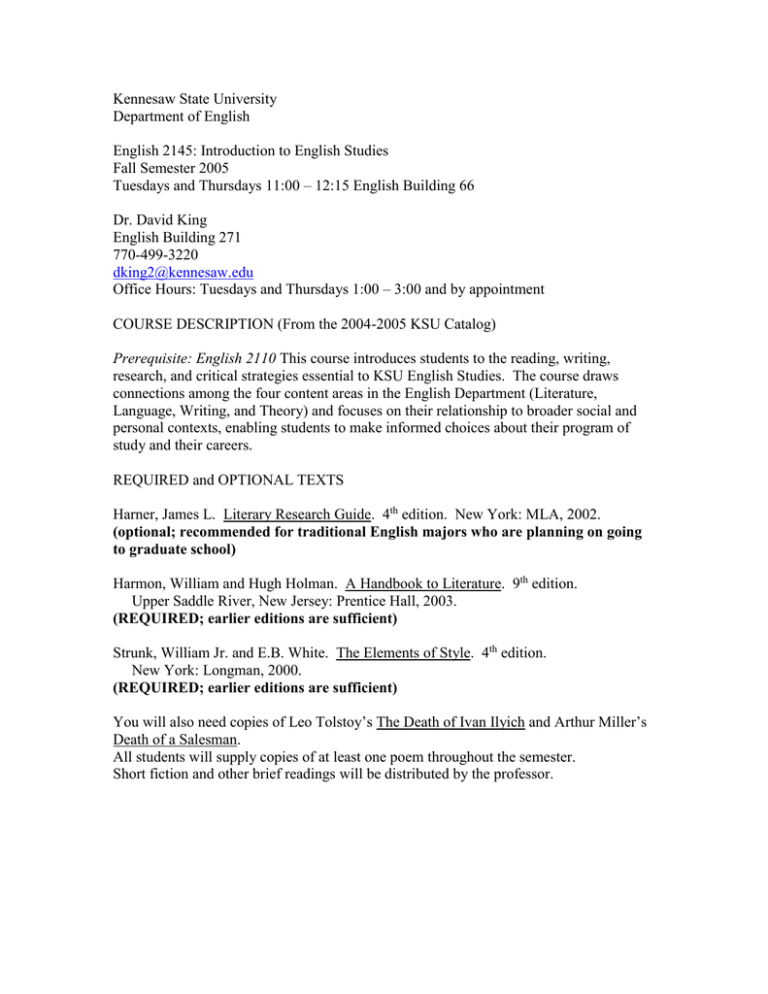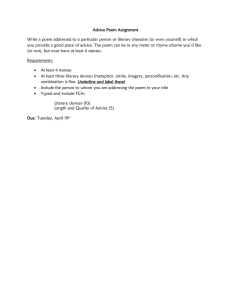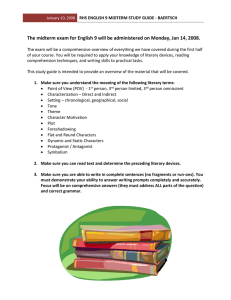ENGL 2145 Fall 2005
advertisement

Kennesaw State University Department of English English 2145: Introduction to English Studies Fall Semester 2005 Tuesdays and Thursdays 11:00 – 12:15 English Building 66 Dr. David King English Building 271 770-499-3220 dking2@kennesaw.edu Office Hours: Tuesdays and Thursdays 1:00 – 3:00 and by appointment COURSE DESCRIPTION (From the 2004-2005 KSU Catalog) Prerequisite: English 2110 This course introduces students to the reading, writing, research, and critical strategies essential to KSU English Studies. The course draws connections among the four content areas in the English Department (Literature, Language, Writing, and Theory) and focuses on their relationship to broader social and personal contexts, enabling students to make informed choices about their program of study and their careers. REQUIRED and OPTIONAL TEXTS Harner, James L. Literary Research Guide. 4th edition. New York: MLA, 2002. (optional; recommended for traditional English majors who are planning on going to graduate school) Harmon, William and Hugh Holman. A Handbook to Literature. 9th edition. Upper Saddle River, New Jersey: Prentice Hall, 2003. (REQUIRED; earlier editions are sufficient) Strunk, William Jr. and E.B. White. The Elements of Style. 4th edition. New York: Longman, 2000. (REQUIRED; earlier editions are sufficient) You will also need copies of Leo Tolstoy’s The Death of Ivan Ilyich and Arthur Miller’s Death of a Salesman. All students will supply copies of at least one poem throughout the semester. Short fiction and other brief readings will be distributed by the professor. COURSE REQUIREMENTS AND GRADING SCALE 1. *A midterm exam – 25% 2. *A critical documented essay in MLA style – 25% 3. *Class participation, including presentation of a poem, fulfillment of the online portfolio workshop and a library exercise – 25% 4. *A final exam – 25% I use a traditional grading scale: A = 100-90 B = 89-80 C = 79-70 D = 69-60 F = Below 60 *Exams Both the midterm and the final exam are objective tests that cover literary terms, literary history, literary theory, and trends in the discipline. *Critical Essay The critical essay, which must include secondary source materials documented in current MLA style, is an 8-10 page paper related to a topic of your choice. You should choose an area of English Studies related to your major emphasis or your career interests. An education major, for example, might choose a topic related to the teaching of English, while a literature or film student might choose to explore in detail a particular text. Details for this paper, noted on a separate handout, indicate several other options. *Participation Because one important aim of English 2145 is creating a sense of community among students and faculty in the Department of English, your participation in this course is very important. Plan to attend all classes; certainly don’t miss more than two. Take part in class discussions. Ask questions. All students must facilitate the discussion of a poem. Each student must choose a poem, provide copies to the professor and student, and lead a reading and explication of the poem. We will cover the poetry in the first 1520 minutes of each class session beginning in about the second week of the term. Students sign up for poem presentations on the first day of class. All students must also participate in the online portfolio workshop. All students must also complete an abbreviated library research exercise. COURSE CALENDAR Week 1 – Tuesday 23 August: First Day of Class Introduction to the course; what is an English major? Pre-assessment exercise. Thursday 25 August: A brief history of the discipline of English. Week 2 – 30 August and 1 September A brief history of the fundamental developments of the English Language, including a definition of your language identity. Watch short film on American English. Week 3 – 6 and 8 September Online portfolio workshop. All students must attend and participate. NO CLASS ON THURSDAY 8 SEPTEMBER Week 4 – 13 and 15 September The elements of fiction—understanding context, text, and subtext: the short story. Class reads and discusses in depth Flannery O’Connor’s “A Good Man is Hard to Find” (I’ll provide copies) Week 5 – 20 and 22 September The elements of fiction continued: the novella. Read and discuss Tolstoy’s The Death of Ivan Ilyich (You will need your own copy.) Week 6 – 27 and 29 September Fundamental literary theory, including the New Criticism and the New Historicism. Weeks 7 and 8 – 4 and 6 October and 11 and 13 October An outline of English and American history and the English and American Literary Canons. What constitutes a canonical text or a “major” or “minor” writer? How is the canon changing? What are some of the major controversies and divisions in the discipline? How have cultural studies impacted the development of the American canon? MIDTERM EXAM ON THURSDAY 13 OCTOBER LAST DAY TO WITHDRAW WITHOUT ACADEMIC PENALTY FRIDAY 14 OCTOBER Week 9 – 18 and 20 October Introduction to some basic library resources in English Studies including the Dictionary of Literary Biography. For students pursuing the library assignment as the paper option, we will have a special workshop for you this week. Week 10 – 25 and 27 October Literacy in America and problems in the teaching of writing. Class reads and discusses Richard Wright’s “The Library Card” from Black Boy (I will provide copies). Weeks 11 and 12 – 1 and 3 November and 8 and 10 November Elements of drama; class reads, watches, and discusses Miller’s Death of a Salesman. Week 13 – 15 and 17 November New developments in critical theory including Marxism, Feminism, Psychoanalytic Criticism, Post Structuralism, and Post Colonial Theory. Defining your own critical stance. Week 14 – 22 and 24 November Film as an area of English Studies. NO CLASS ON 24 NOVEMBER THANKSGIVING Week 15 – 29 November and 1 December Film as an area of English Studies continued. As an exercise, we’ll consider four great cinematic teachers: Mr. Chips, Mr. Crocker-Harris, Professor Kingsfield, and Mr. Keating. What might these characters suggest about your own approaches to teaching and learning? Week 16 – 6 December TUESDAY 6 DECEMBER IS THE LAST DAY OF CLASS. CRITICAL ESSAYS ARE DUE ON THIS DAY. FINAL EXAM THURSDAY 8 DECEMBER 11:00 – 1:00 EB 66. Classroom Policies and Statement of Academic Honesty 1. Turn off all cell phones and pagers before entering the classroom. 2. Food is not allowed in class; water, coffee, cokes, etc. are acceptable, but not in a computer lab. 3. Be attentive during class discussions; exhibit respect for the person who is talking, and raise your hand to be recognized. A college course should be enjoyable, but this does not excuse you from either civility or common courtesy. 4. Make-up work and late work are only permitted at my discretion, and only allowed if you have consulted with me in advance. Dr. King’s Attendance Policy: As a college student, you are privileged to enjoy new freedoms and responsibilities. The decision to attend class should be your choice. However, you should remember these important points: If you miss a class, you are responsible for gathering all notes, activities, and assignments. Because class participation is an implicit part of your course grade, students who miss several class meetings cannot expect to earn a good participation grade. If you have a legitimate excuse for missing class—illness, family emergency, accident—let me know. If you miss class because you are asleep or otherwise incapacitated, accept the consequences. As a general guideline, I recommend that you miss no more than two class meetings for any course you take as a college student. If you must be late to class, or if you must leave class early, please let me know in advance. ACADEMIC HONESTY STATEMENT: Every KSU student is responsible for upholding the provisions of the Student Code of Conduct, as published in the Undergraduate and Graduate Catalogs. Section II of the Student Code of Conduct addresses the University’s policy on academic honesty, including provisions regarding plagiarism and cheating, unauthorized access to University materials, misrepresentation/falsification of University records or academic work, malicious removal, retention, or destruction of library materials, malicious/intentional misuse of computer facilities and/or services, and misuse of student identification cards. Incidents of alleged academic misconduct will be handled through the established procedures of the University Judiciary Program, which includes either an “informal” resolution by a faculty member, resulting in a grade adjustment, or a formal hearing procedure, which may subject a student to the Code of Conduct’s minimum one semester suspension requirement.




